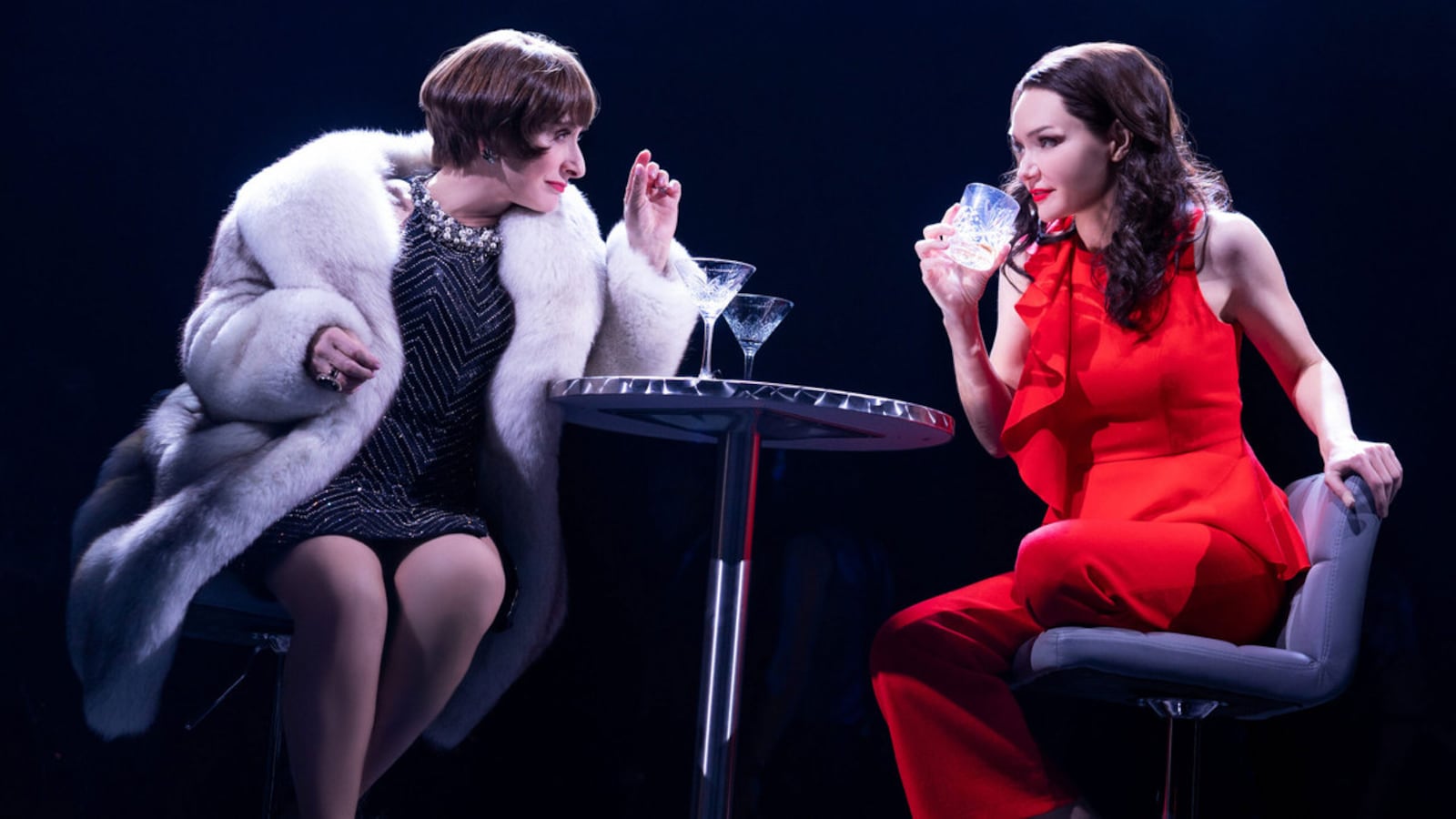On the basis that Christmas is near, presents must be considered, joy should be taken wherever it can be found in this fraught world, and direct guidance is often the most welcome, here it is: Book a ticket or tickets for Company on Broadway (booking to June 26, 2022) right now. Stop what you are doing. Right now. Stephen Sondheim’s musical, with a book by George Furth, opens Thursday night at the Bernard B. Jacobs Theatre and is the best tribute imaginable to Sondheim himself (along with the near-perfect Spielberg adaptation of West Side Story).
Two and a half hours of sublime entertainment that becomes more sublime and more pleasurable as it continues, it is a transporting experience, an emotional one, a full meal with dessert, and at least two drinks of your choice. It has Patti LuPone operating at Peak Fabulous Patti LuPone, a superb Katrina Lenk, a spectacular supporting cast, and an orchestra playing gorgeously from up above the stage—and who wave to the audience as they depart. Wave back at them while you’re whooping into the night.
Lenk is Bobbie—in red jumpsuit, a color of (unknown and undefined) passions—in this playful and inquiring London-originated production, directed with a mixture of intelligence and energy by Marianne Elliott and sleekly choreographed by Liam Steel.
You may have read about Bobbie’s gender switch (from the male character originally known as Bobby), and that one of the couples has become gay. If you are waiting for LuPone as Joanne to sing “The Ladies Who Lunch” and Lenk to sing “Being Alive,” Company’s most famous songs come right at its end. But it’s the best kind of wait, thanks to the cast, Joel Fram’s musical direction, and David Cullen’s orchestrations.
Elliott, through Bunny Christie’s design of illuminated boxes, paints the trajectory of Company as an Alice Through the Looking Glass kind of puzzle, as if Bobbie is literally trying to put shapes and letters in the right order. She appears, disappears, rises and descends in these boxes, although it is telling that when she sings her three, mind-clearing, declarative songs—“Someone Is Waiting,” “Marry Me a Little,” and “Being Alive”—it is on an open stage, bathed in hazy purple light.
The show begins and ends in Bobbie’s apartment, a constraining cube where her friends wait to throw her a surprise 35th birthday party, cake, candles and all, and two lividly huge balloons, showing 3 and 5. At the outset, Bobbie is overwhelmed by them. The cake, the candles, the presents are taking up too much room. We watch as Lenk, with both a languid mischief and nervy determination to maintain control, conducts an investigation that is within herself, while also magically and uncomfortably privy to the sometimes spoken and yet mostly unspoken thoughts of others.
Bobbie speaks directly and indirectly to the Greek chorus of her friends (who chant “Bobbie” at her as a sad and patronizing lament), and they to her. All of them are in relationships. She is, right from the beginning, a ghost at her own party and in her own life story, always being sung about, observed, judged, and discussed. The gender switch means that her 35th birthday, which forms the anchor of the show, comes with the audible tick-tock of the biological clock. The show is a perfectly baked mixture of the witty and mournful, the sassy and serious, the uproariously funny and piercingly melancholy.
Early on, the fabulous Jennifer Simard steals scenes as Sarah, revealing her well-worn cynicism, and her tummy, as she exercises in front of Bobbie. “I’d kill for chocolate. Or a baked potato with sour cream and chives. Doesn’t that just make you writhe? Or hot sourdough bread and all the butter there is.” She opines: “Sara Lee is the most phenomenal woman since Joan of Arc.” She is the first to note that Bobbie has set herself up as an all-observing sage, separate from her friendship group, somehow loftier than what Helen Fielding’s Bridget Jones called the “smug marrieds.”
Jenny (Nikki Renée Daniels), who is married to David (Christopher Fitzgerald), says: “Sometimes I’d like to be single.” And, as he extols coupledom, she adds: “If you’re married, your life has a—what? Your life has a point to it—a bottom. I have everything—except freedom. Which is everything—huh? No. This is everything. I got my husband, my kids, a home, maybe you got to give up to get.”

Christopher Sieber, Jennifer Simard, Katrina Lenk, and Patti LuPone in “Company.”
Matthew MurphyHer friends try to set her up with “this guy from the office,” and “my best friend from high school.” Every single person in the audience will know the well-worn mechanics of enforced matchmaking. What about the guy “into all those exotic mystiques: The Kama Sutra and Chinese techniques—they say he knows more than 75... Call me tomorrow if you’re still alive!”
Bobbie isn’t alone, of course. But her male fuck-buddies are pretty unfulfilling. PJ (Bobby Conte) helms a wonderful staging of “Another Hundred People,” which uses a stage full of the individual “Company” letters to convey the teeming streets of New York—“a city of strangers,” where “some come to work, some to play”—and his own, slightly too intense love of the city. (This jigsaw arranging and rearranging ultimately spells out NYC, meriting its own round of hometown applause.)
Theo (Manu Narayan) seems sweet, but in front of a fountain tells Bobbie he is getting married. Claybourne Elder as the hunky flight attendant Andy has the longest time on stage, and it’s wonderful to watch him—as dumb as he is painted, and clad only in tight briefs—and Bobbie circle each other, sleep with each other, and confuse each other. Just what are they to each other? What should they be to each other? What could they be to each other? And just what does Andy’s story about a caterpillar mean? Bobbie just wants sex, but Andy—Elder plays him brilliantly trying to string thoughts and words together—must have his ponderous say.
The loudest audience roar the night this critic went did not go to LuPone but to the tremendous Matt Doyle as Jamie when he sang “Getting Married Today,” that wonderful, frenzied inner nervous breakdown made outer, as another gender-switched character he prepares to marry his sweet partner Paul (Etai Benson). It really has the best lyrics, sung at 100mph, of the show: “I telephoned my shrink and he said/Maybe I should come and see him Monday,/But by Monday I’ll be floating/In the Hudson with the other garbage.” Doyle barnstorms this, and the roof of the theater almost blows off with the audience’s response.
Jamie’s disavowal of coupledom echoes with Bobbie, and indeed she suggests they marry. This brings Jamie to his senses; he does love Paul. So, wonder Bobbie, is there a middle ground of commitment and detachment that could work for her and a partner, encapsulated in the title and lyrics of “Marry me a little,” which entreats this future plus-one to “Love me just enough. Warm and sweet and easy, Just the simple stuff.”
The acidity of Company returns in fuller force in act two, where the stage-full of couples caustically comments on Bobbie’s unflappable single-person demeanor. “What would we do without you? How would we ever get through? Who would I complain to for hours? Who’d bring me the flowers/When I have the flu?/Who’d finish yesterday’s stew? Who’d take the kids to the zoo? Who is so cool?/And who is so deep?”
As Bobbie sleeps with Andy, her friends float around her as ghostly narrators, snarking “Poor Baby” at her. “Why these meaningless relationships? They can’t make you happy. But you know better.” At this stage, multiple Bobbies in multiple red jumpsuits, with kvetching babies and other hunky Andys appear around the ostensible sleeping forms of the real ones. (Chris Fisher’s illusions are pin-sharp executed, as your eyes search for visible holes in walls and floors.) We are watching Bobbie’s own fever dream of a set of possible coupled futures, as a man sleeps next to her. The fear is real.

The cast of “Company.”
Matthew MurphyMost tough on Bobbie is LuPone as Joanne, who has seen and done more than most, decked in fur in a kind of Studio 54, demanding a drink (which becomes itself a moment of delicious comedy with an over-it waiter). “Smoking may be the only thing that separates us from the lower forms,” she says, before launching into a masterful, “The Ladies Who Lunch,” where you hear the lines discharged like bullets, and also the formation of them in the moment, lips smacked against glass, psychological aim being carefully taken. There is no avoiding the thing she is trying to avoid, Joanne tells Bobbie, even as Bobbie tries to avoid whatever that something is.
“Being Alive”, the final song, can be seen as a completion of Bobbie’s investigation. “Make me confused, Mock me with praise, Let me be used/Vary my days” could be seen as an acceptance of the need for involvement, that the greatest risk of being intimate is also the greatest reward. That should be an end to this—the conversion of a commitment-phobe, the acceptance that people need people; that Company—romantic and social—is the end-game, albeit imperfect and flawed and perilous, of us as social beings.
But this luminous production emphasizes in its final moments that Bobbie is still searching, but on her own terms, perhaps now armed with more insight as she prepares to shape her future. She returns to the lit box of her apartment, but this time she is in charge of that damn cake.







